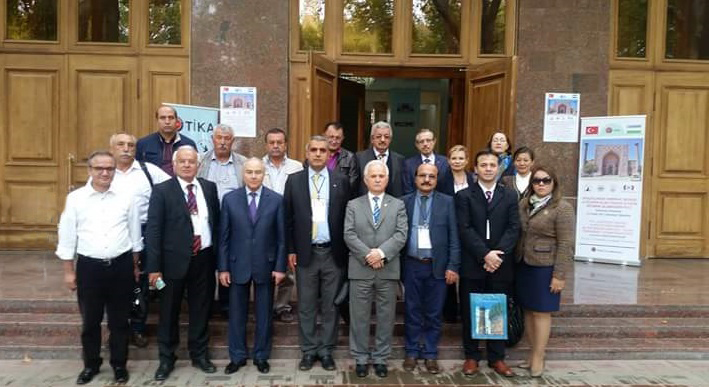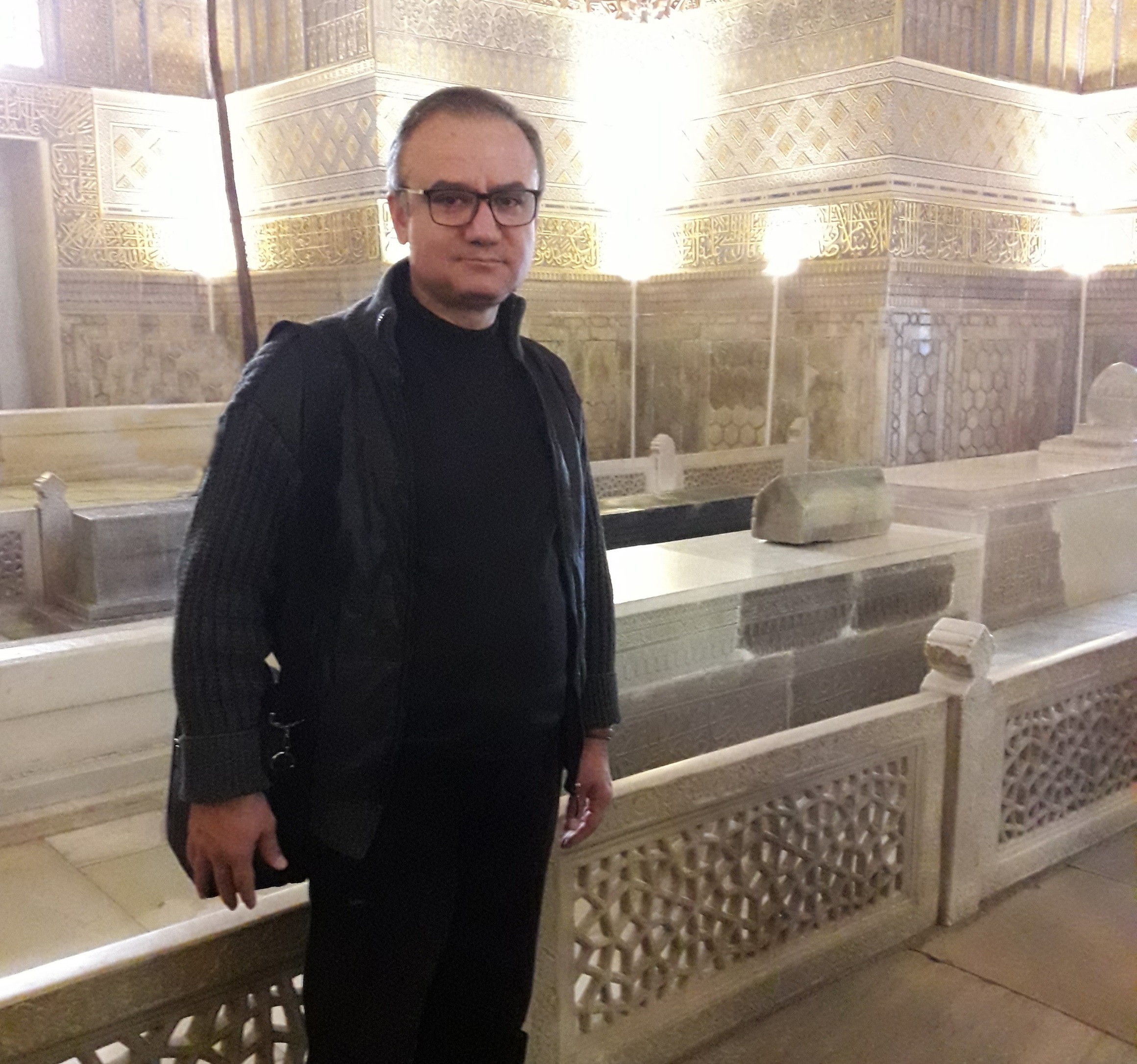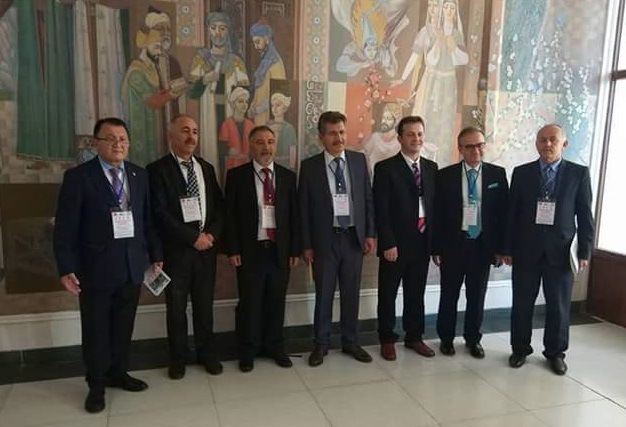“Samarkand is my second hometown”

The next guest of the project "Heart and Pen" was a prominent representative of Turkish literature, poet, writer, editor-in-chief of the magazines "Temrin" and "Ajami", Master of Samarkand State University Sharif Yilmaz.
- What is literature for you?
- In the course of the historical development of mankind, the attitude towards literature has changed from century to century. At certain periods it was considered a basic part of mores, while at other times it was accepted as a psychological state. Literature is now a branch of the arts. In the Islamic or Turkic world, poetry and music have interested and united people since ancient times. Even today, however, literature and music are unique art forms. I consider literature to be the branch of art that, through inspiration, shares love and kindness with people.
What topic do you find difficult to write about?
- I came to literature with poetry, and later I tried my hand at writing stories. I haven't written a novel yet. I have been writing poetry for many years. As my respect for poetry, understanding and knowledge of poetry grew, it became more and more difficult for me to write poetry. In the process of creating a poem, not only the pen works, but also the heart, the pain and sorrows that the pen puts on paper are first of all reflected in the heart. The poet's heart hurts when he writes a poem.
- In 1992-1995 you worked at Samarkand State University. Can you share your memories of our university?
- I went to Samarkand when Uzbekistan first gained independence. Samarkand State University at that time was named after Alisher Navoi. It was one of the most prestigious institutions of higher education in Uzbekistan. Samarkand State University is known and recognized throughout the Turkic world today. I graduated from the Faculty of Language and Literature of the Selcuk University and intended to continue my scientific research at the universities of the fraternal peoples. Since Samarkand is the most prestigious and world-renowned city, I decided to study at the SamSU Master's program and came to Samarkand. The first person I met there was Doctor of Philology, Professor Zhuliboy Eltazarov. At that time, he worked at the Department of Uzbek Linguistics at Samarkand State University. Zhuliboy Eltazarov introduced me to one of the areas of Uzbek linguistics, professor, doctor of philological sciences, scientist of the Republic of Uzbekistan Rahmatulla Kongurov.
Rahmatulla Kongurov invited me to work, saying that he was organizing a new Turkish language course at the university and that he was looking for someone to teach this course. So I started working at SamSU. Then the teacher Kongurov presented the topic of his dissertation on the topic “Possessive and conjunctive adverbs in the Uzbek language”. I will never forget this moment: Eltazarov, me and Kongurov are sitting in the department. After the lecturer set the dissertation topic, he looked at Professor Zhuliboy and said: “This Turkish guy does not know Russian and Uzbek, can you help me with a literature review on the dissertation topic?” and looked at me. : "If you complete your dissertation, you will defend the Turkish language in Turkey." I promised the teacher that I would study Uzbek until I finished my dissertation and defended it in Uzbek. Master approved my decision with both surprise and joy. I learned a lot from Rakhmatulla Kongurov. I am still grateful to this man, I will never forget the good help that he gave me. The professor was a real scientist of the Uzbek people.
When I was in Uzbekistan, Navruz made a big impression on me. The taste of the sumalak I ate there is still in my mouth. Uzbeks also have a loose dish called somsa. It is similar to the Turkish food "simit". In addition, for the first time in Uzbekistan I tried the Uzbek plov, which the Uzbeks call "Osh". It is loved in Turkey, but in our country it is made only from rice. Sometimes peas are added. Turkish pilaf is tasteless next to Uzbek pilaf.
I won't forget one thing, it was cotton season. At this time, the students went to pick cotton. Although no one forced me, I went to cotton out of interest. I was very interested in Uzbek villages. During the cotton season, I visited Uzbek villages and observed people. True, the living conditions were unsatisfactory, but the hope burning in the eyes of the staunch Uzbek people, and the joyful look of the living, who find happiness even in these simple things, made a great impression on me.
What writers and poets from Uzbek literature do you know? Have you ever been interested in modern examples of Uzbek literature?
When I was in Uzbekistan, I was not very interested in fiction. My scientific research did not leave time and opportunity for this. I was very busy. Along with scientific research, I was also responsible for teaching Turkish to Uzbek students and teachers. However, when I had time, I followed the work of Uzbek poets Erkin Vakhidov, Abdulla Oripov, Rauf Parfi. On one of my trips, I personally attended an interview with Erkin Vakhidov. I love the poet's poem "Uzbegim". We also met Abdulla Oripov at the Union of Writers of Uzbekistan. At that time, the poetess Zulfiya was still alive. After reading the fiery poems of the poetess, I wanted to get to know her. When I contacted her children, they told me that Zulfiya was ill. They said, "If you wait a little, he will be well by the end of the summer, and then you will be able to see him." Unfortunately, we were not destined to meet...
I met the representative of Uzbek fiction Tahir Malik after returning to Turkey. I met the writer at an event organized in Istanbul by the chairman of the Writers' Union and a group of young artists. Tahir Malik came to receive the award "For Services to the Turkic World."
I know Odil Yakubov from Uzbek literature. Some of his books have come down to us. I read the Turkish translation of the writer's novel Adolat Manzli. In my personal library I keep Uzbek editions of Abdulla Kadiri's works "O'tkan kunlar" and "Scorpion from the altar". But even if Turkish students have heard these names and works, most of them do not know them closely. So, the rapprochement of the two countries occurs primarily through language, and the rapprochement of languages occurs through literature. There are many bright writers in Uzbek literature. The ones I know are just a drop in the ocean.
- The reason for the closeness of the Uzbek and Turkish languages is that both languages belong to the same root and family. From this point of view, what harmony do you see in the tonality of the Uzbek and Turkish languages?
- It is known that Uzbek and Turkish languages belong to the family of Turkic languages. Turkish Turkish belongs to the Oghuz branch and Uzbek Turkish belongs to the Kypchak branch. Before the division of Turkestan into khanates, these two languages were 90% similar. The newspaper, published in Istanbul in the last period of the Ottoman Empire, was easily read and understood by the Tashkent intelligentsia. The reason for this was that Arabic and Persian words were common in the language. During the Shura period, Russian words entered the Uzbek language, and a number of words from Western languages entered the Turkish language. As a result, the gap between languages has widened somewhat. Today, the most effective way to eliminate this gap is to establish literary and creative ties between peoples. This is more effective than political cooperation. If the brotherhood of our peoples is strong, cooperation will also improve in the field of politics. Uzbek and Turkish are phonetically compatible. Although the harmony of sounds, in scientific terms, vowel harmony, has not been preserved in the Uzbek language, it has been well preserved in our country. In many cases, representatives of the two peoples understand each other without an interpreter.
- What is the current level of Uzbek-Turkish literary ties?
- In the first years of Uzbekistan's independence, relations between the two peoples were very weak. Of course, there were good reasons for this. Because the two countries did not know each other well. However, there are no problems or obstacles in Uzbek-Turkish relations. We are brothers. We support each other in any situation. The ancestors of the Uzbeks are also our ancestors.
- What is the current level of Uzbek-Turkish literary ties? What work has been done in this direction in the publishing house "Ferfir"? Please provide information about the activities and directions of the publishing house as a whole.
- The publishing house publishes not only for profit. Our goal is to present to the world the great writers and poets of the Turkic world, to bring new writers and poets to the surface. To this end, we have established two literary journals. The literary magazine "Atsiemi" is designed to reveal new talents. This word translated from Uzbek means "zealous". The second magazine is "Temrin". We publish articles by researchers, masters and scientists.
In recent years, the Ferfir publishing house has prepared special collections of Uzbek literature by Abdulla Kadiri and Cholpon.
- At SamSU, you mainly worked in the field of modern Turkish language and methods of its teaching. If we compare the level of study of the Turkish language by Uzbeks today with that time, what changes?
- I was very surprised by the interest of Uzbek students in learning the Turkish language in the process of teaching the Turkish language. True, at first I saw in them a desire to learn a foreign language that was foreign to them. But soon this hadith was replaced by interest and enthusiasm. Today, many immigrants from Uzbekistan live in Turkey. They learn Turkish easily and quickly. Firstly, as I said, the Uzbek and Turkish languages originated from the same root. Phonetically they are very close to each other. That is why it is easier to learn compared to other foreign languages.
- When Uzbek readers think of Turkish literature, writers like Rashod Nuri Guntekin, Aziz Nesin, Yashar Kamal, Orhan Pamuk come to mind. What do Turkish readers think about when they think about Uzbek literature?
- Literature is the strongest link in relations between the two countries. Uzbeks have known Turkish literature since Soviet times. For example, Nazim Hikmat, Aziz Nesin, Rajod Nuri Gyuntekin, Yashar Kamal and Orkhan Kamal and others. True history shows that of our great writers and poets, the Soviets brought only communist thinkers to Uzbekistan. However, there are great writers in Turkish literature such as Peyami Safo, Tarik Bughra, Ahmed Hamdi Tanpınar.
Although this is a bitter truth, I will say that Turkish students know little about the representatives of Uzbek literature. The reason is that many translated works have not been published. In this regard, the Union of Writers of Uzbekistan, the Ministry of Culture and other specialized organizations should carry out serious work on the publication of classical Uzbek works in Turkey. For example, the Association of Writers of Azerbaijan is very active in this respect. They publish many books and printed materials in cooperation with the Temrin magazine and the Ferfir publishing houses.
- Today, the works of modern Turkish writers such as Elif Shafak and Amin Shenlykoglu are widely read in Uzbekistan. What can you say about these creators? Do they have the same attention in Turkey?
- Elif Shafag is a famous writer. She writes in a postmodern style. But there are stronger names in Turkish literature as well. Writers such as Amina Shenlikoglu, Shule Yuksal Shenler, Ahmed Gunbay Yildiz create more in combination of religion and literature. Their goal is not to create a literary novel, but a religious work. These works cannot be powerful works. Turkish literature does not consider such literature superior.
- What are your plans for the future?
- In the future, we intend to continue to discover young talents in the Temrin magazine, to present new projects for writers, new book editions. The magazine "Temrin" today has become the pride of the Turkic world. We try to maintain and improve this status. Our work in this direction continues. In the future, we also plan to establish an award for young talents from the Turkic world.
- Traditional question: Each region has its own literary and scientific environment. What can you say about the literary environment of Samarkand, about the ascetics of the world of science?
- Samarkand is a historical city that occupies an important place in world history and culture. Samarkand is my second native city. The most beautiful moments of my life were spent in Samarkand. I met great scientists, scholars, figures of science and literature. When I was in Uzbekistan, I visited almost all the cities of the republic, but not a single city was like Samarkand. Amir Temur chose Samarkand as his capital not in vain. The air, soil and water of Samarkand are different. Samarkand bread cannot be found in any other city of Uzbekistan. In the first years of independence, research conducted at Samarkand State University, works written by academicians and their research activities play an important role in the literary and scientific environment of Samarkand.


Interlocutor of Irod BEKMURODOV
Samarkand State University
Information Service Officer

